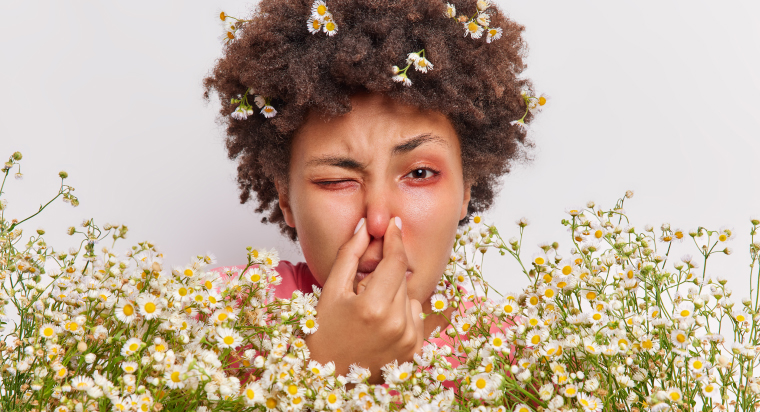As the seasons change, many individuals experience the discomfort and frustration of seasonal allergies. The itchy eyes, sneezing, and congestion can significantly impact daily life. In this blog post, we will provide answers to questions like how to manage seasonal allergies, causes of seasonal allergies and also provide strategies to improve your overall well-being. By incorporating these strategies into your routine, you can enjoy a happier and healthier life, even during allergy season.
What are Seasonal Allergies?
Seasonal allergies, also known as hay fever or allergic rhinitis, are a common health issue that affects many individuals during specific times of the year, typically when certain plants release pollen into the air.
The primary triggers of seasonal allergies are airborne substances such as pollen grains, mold spores, and other allergens that are abundant during specific seasons. Common allergenic plants include trees (such as birch, oak, and cedar), grasses (such as Bermuda grass and Timothy grass), and weeds (such as ragweed and sagebrush).
When these allergens come into contact with your body, your immune system reacts, causing various symptoms.
Common Symptoms of Seasonal Allergies
To learn how to manage seasonal allergies, you must first understand the symptoms. Seasonal allergies can manifest in various ways, including:
- Sneezing, nasal congestion, runny or itchy nose
- Watery, itchy, or red eyes
- Scratchy throat and cough
- Fatigue and irritability due to disrupted sleep patterns
How To Manage Seasonal Allergies
Learning how to manage seasonal allergies is critical for your overall health. Here are some points to note as you endeavor to prioritize your well-being.
- Stay informed and track pollen levels
Staying informed and tracing pollen levels are a great way to get ahead. How can you do this?
- Monitor local pollen forecasts: Stay informed about the pollen levels in your area by checking reliable sources such as the National Allergy Bureau or local weather websites.
- Plan outdoor activities wisely: Limit your time outdoors when pollen counts are high, particularly during mid-morning and early evening when pollen levels tend to peak.
- Consider indoor exercise: On high pollen days, opt for indoor exercise alternatives like gym workouts or home exercises to minimize exposure.
- Create an allergy-free home environment
It is also important to allergy-proof your home to ensure your overall safety.
- Keep windows closed: Prevent pollen from entering your home by keeping windows and doors closed, especially during peak pollen times.
- Use air purifiers: Consider using high-efficiency particulate air (HEPA) filters or air purifiers to trap allergens and improve indoor air quality.
- Clean regularly: Dust and vacuum your home frequently to remove allergens that may have settled on surfaces.
- Practice effective allergy prevention measures
This is another helpful tip on how to manage seasonal allergies. Here’s how to practice this.
- Rinse off after outdoor activities: After spending time outside, take a shower and change your clothes to remove any pollen that may have collected on your skin and clothing.
- Wear protective gear: If you need to be outdoors during high pollen periods, wear sunglasses to protect your eyes and a hat to prevent pollen from settling on your hair.
- Consider nasal irrigation: Nasal saline rinses or nasal irrigation using a neti pot can help clear out allergens from your nasal passages.
- Seek relief through medication and treatment options
There are some medications that are very helpful in managing allergies. It is important to consult your healthcare provider to recommend the best option for you.
- Over-the-counter antihistamines: Non-drowsy antihistamines can help alleviate symptoms such as sneezing, itching, and runny nose. Consult with a pharmacist or healthcare provider to find the right option for you.
- Nasal sprays: Nasal sprays containing corticosteroids can reduce inflammation in the nasal passages and provide relief from congestion.
- Allergy shots (immunotherapy): If your symptoms are severe and not adequately controlled by other measures, allergy shots may be recommended to help desensitize your immune system to specific allergens.
- Adopt lifestyle changes
It is also vital that you seek and adopt lifestyle changes that promote healthy living. Adopting new habits may be hard, but with consistency and dedication, you can make them a part of you.
- Maintain a clean indoor environment: Regularly clean and dust your home, including frequently touched surfaces, to minimize allergens.
- Manage humidity levels: Use a dehumidifier to control indoor humidity levels, as high humidity can promote the growth of mold and dust mites, worsening allergy symptoms.
- Optimize your diet: Incorporate foods rich in anti-inflammatory properties, such as fruits, vegetables, and omega-3 fatty acids, to support overall immune health and reduce allergy symptoms.
- Consult a healthcare professional
If your symptoms persist, worsen, or significantly impact your daily life, consult a healthcare professional, such as an allergist or immunologist. They can provide personalized advice, recommend appropriate treatment options, and develop a management plan tailored to your specific needs.
Conclusion
Seasonal allergies can be a challenging and disruptive part of life, but with proactive measures and effective coping strategies, you can minimize the impact and enjoy a happier and healthier life, even during allergy season. By staying informed, creating an allergy-free home environment, practicing prevention measures, seeking relief through medication and treatment options, making supportive lifestyle changes, and adopting other helpful tips on how to manage seasonal allergies, you can better manage your symptoms and improve your overall well-being.
At the Pulmonary Clinic of the Carolinas, our team of experienced healthcare professionals is dedicated to helping you effectively manage your seasonal allergies. Contact us today to schedule a consultation and learn more about effective treatment options and strategies to manage your seasonal allergies.



 Translate
Translate

